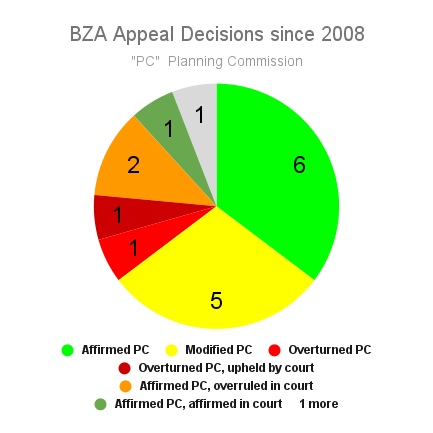[Updated 5-20-2022 with 4 additional appeals cases located by county staff]
Executive Summary
Knox County is considering a zoning ordinance proposal to change the appeals process for Planning Commission Uses on Review (“UoR”) – to require appeals to be filed via lawsuit directly to court instead of the current process of first going through the BZA. The Knox County Planning Alliance (“KCPA”) believes this proposed change is unnecessary and a step backwards because:
- BZA is more accessible to planning applicants and neighbors, is faster, and operates with wider authority to weigh the evidence than a court does;
- The BZA process is faster than court – never more than a few of months. Appeals create uncertainty. The quicker it is resolved the better for everyone.
- There have only been a modest number of UoR appeals filed (17) in the last 15 years, with the majority resolved at BZA within a few months, whereas each further appealed to court took more than a year to resolve in courts; and
- If the proposed change is to be considered at all, it should be considered not in isolation, but instead as one element of Knox County’s current comprehensive review of land use planning and processes – Advance Knox. If issues related to Use on Review appeals are identified, those can be identified and presented to the Advance Knox team with requests for recommendations.
If we urgently to reduce the number of UoR appeals filed, KCPA recommends updating the two ordinances that generate most of those appeals:
- Planned Residential which generates the majority of Use on Review appeals. Work was started on this in 2020 but is currently on pause.
- Requirements for treatment centers and related uses. Codify those as use-by-right. The City of Knoxville recently did this, adopting clear and prescriptive criteria for location and requirements, which removes the “Not In My BackYard” emotion, and facilitates getting these urgently needed services into our community.
The Proposed Resolution at County Commission
This month Knox County Commission will vote on initiating a change to Use on Review appeals. Currently, after Planning Commission votes, the decision can be appealed to the county Board of Zoning Appeals, and then to Chancery Court. A proposal on the May 2022 County Commission Agenda seeks to eliminate the first level appeal to the BZA, and instead require appeals to be filed directly via lawsuit at Chancery Court.
Rationale Provided by Resolution Sponsors
The proposal views the BZA appeal process as an intermediary step between Planning Commission approval and an appeal to court, where unelected appointees slow down the approval process. It is viewed that eliminating BZA from the appeals pipeline gets rid of an unnecessary step and is necessary to address the housing crisis.
KCPA Perspective
Seventeen (17) Use on Review appeals have been filed since 2008.
The BZA achieved a final resolution for 13 of the 17 appeals, all within 2 months of first appearing on the BZA agenda. This is faster than going to court. It gives all parties an opportunity to further assess the proposal and understand the impacts, which are not available under the writ of certiorari review. Only four (4) of those 17 appeals to BZA were further appealed to court, with court affirming BZA twice and reversing BZA twice. If all appeals are filed directly with court, per the proposal, then it is likely most of these appeals would drag on for more than a year. If it was in effect for the last 15 years, then 13 additional projects could have been subject to an additional 1+year delay. This proposal is a step backwards.
There have been 17 use on review appeals in 15 years – averaging about 1 per year. This is not clogging up the development pipeline when one considers that Planning Commission considers 5+ use on review cases a month.
Upon assessment, KCPA finds that the argument about needed / not needing attorney representation is mostly moot. All but one of the appeals to BZA had at least one, if not both, of the parties represented. If parties choose to have representation at BZA, it’s usually less costly than at court – there are fewer filings and procedures to comply with. And while Chancery Court doesn’t require attorney representation, the saying “A man who is his own lawyer has a fool for a client” rings true.
The argument about unelected appointees vs. elected judges also rings hollow, because the initial application for a Use on Review is voted on at the Planning Commission by unelected appointees.
The proposed change impacts community members far more than development applicants. Fifteen of the seventeen (15 of 17) appeals were filed by community members/groups.
KCPA’s experience working with neighborhoods, and from advisors who have served on BZA, is that UoR appeals are often filed because the community doesn’t have time to understand the proposal and engage with an applicant in the six calendar days between the staff recommendation and the Planning Commission hearing. The current Use on Review appeals process resolves issues much more quickly (usually 45-75 days after the Planning Commission hearing), while court cases and appeals have taken more than a year. Filing appeals to the BZA gives applicants and community members a fast, fair and community-driven process to perform a deeper review on the most controversial of cases.
Unmentioned in the proposal or discussion is the standard of review that BZA has versus a court. A court has less authority to act. The Board of Zoning Appeals holds a ‘de novo’ hearing – through fresh eyes. The BZA weighs all evidence and testimony, with latitude to determine if the use is compatible, if there are adverse impacts, if there are mitigations – the exact same criteria that Planning Commission uses. An appeal to court is through a writ of certiorari. The only issues raised in such a writ is whether the lower body (Planning Commission or BZA) exceeded its jurisdiction or acted illegally, arbitrarily, or fraudulently. The court determines where there is any material evidence that supports the action of the administrative agency, and courts may not (1) inquire into the intrinsic correctness of the lower tribunal’s decision, (2) reweigh the evidence, or (3) substitute their judgment for that of the lower tribunal. In short – the court operates with reduced authority. This proposal eliminates the opportunity for a local board of volunteer commissioners to weigh the evidence under the Knox County Use on Review standards for approval.
In four of the appeals raised, KCPA observes that minor modifications were made to applications that improved the compatibility of the proposed use with adjacent properties. Each of these was resolved within 75 days of the Planning Commission hearing, a desirable outcome which provided a speedier resolution than sending these to court or filing a new Use on Review appeal:
- 6-F-14-UR: modified setbacks to be more compatible with neighboring houses
- 5-E-15-UR: modified how sidewalks were required to be constructed to better fit the slopes and terrain
- 8-D-20-UR: addressed a UoR that was approved without the required stormwater plan; added condition that stormwater plan would be provided to neighbors for comment and input
- 12-A-20-UR: addressed access to an amenity area
Finally, based on the volume of appeals – this isn’t a big problem. We think our planning staff, planning commission and county commission have bigger issues to tackle – Advance Knox being the most important.
Addressing the Root Causes of the Problem
Generally, KCPA believes the appeals process is working well. However, there is always room for improvement. Nobody wants to file an appeal – appeals are costly and result in delays and uncertainty for use applicants, neighbors, community, everybody. The best way to do this is to empower the Planning Commission to make better rulings through updated, clearer, and more prescriptive zoning ordinances and preserve the existing appeal process to BZA.
How do we do that? KCPA has three proposals:
- Update Planned Residential which generates the majority of Use on Review appeals. Work was started on this in 2020 but is currently on pause.
- Update requirements for treatment centers and related uses, and codify those a use-by-right. The City of Knoxville recently did this, adopting clear and prescriptive criteria for location and requirements, which removes the “Not In My BackYard” emotion, and facilitates getting these urgently needed services into our community.
- Provide more time for the community between publishing the staff report and the planning commission meeting. Currently there are only 6 (six) calendar days, which is too short a time for community members to identify and assess impacts, meet with the applicant, and then put items into writing for consideration by Planning Commissioners. This may work for rezonings, which are a two-step process (recommendation by Planning Commission and vote by legislative body), so there is a month between those hearings to have additional conversations before a final decision is made. Use on Review decisions are final at Planning Commission, and have more complex applications (site plans, traffic studies, noise, stormwater, etc) to assess.
If addressing Use on Review appeals is a priority, then KCPA asserts the above proposals are more effective for all parties. However, we have limited resources of time and staff, and we should weigh if the appeals volume and any delays outweigh the valuable work being done for Advance Knox. KCPA urges that the emphasis continue to be on Advance Knox, which will produce a comprehensive picture and recommendations for us.
KCPA may be contacted at contact@kcpa.us
The Data
The below data is what KCPA members could identify based on published agendas, records, recollections and minutes they could find for meetings. A complete archive of BZA agendas and minutes is not available online. KCPA has provided this list to county staff and requested to be informed if any other UoR cases are identified in that timeframe and will update the table on its website posting, and will revise the analysis if additional identified cases will lead to different impacts and conclusions.
KCPA Data on County BZA Use on Review Appeals since 2008 (opens in separate tab)

